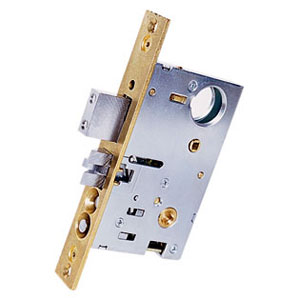|
Having read the FAQ's you are still unfulfilled and seek more enlightenment, so post your general lock picking questions here.
Forum rules
Do not post safe related questions in this sub forum! Post them in This Old Safe
The sub forum you are currently in is for asking Beginner Hobby Lock Picking questions only.
 by ElbowMacaroni » 6 Sep 2009 4:02 by ElbowMacaroni » 6 Sep 2009 4:02
Ok, here I go again with the silly questions... What is it that makes a mortise lock a mortise lock? I mean if you think about it, most door locks that don't move a hasp of some sort are effectively a mortise and tenon joint, and yet deadbolts aren't called mortise locks and they definitely use the principle of a mortise and tenon to hold the door shut. Thanks for helping to clear my fog of newbirific ignorance  -EM "Cave ab homine unius libri"
Beware of anyone who has just one book
-

ElbowMacaroni
- Supporter

-
- Posts: 266
- Joined: 5 Jul 2009 0:58
- Location: Southeast USA
-
 by Tyler J. Thomas » 6 Sep 2009 10:59 by Tyler J. Thomas » 6 Sep 2009 10:59
The designation isn't a reflection of how the door and lock interact but how the lock is installed on the door. A mortise lock is defined as:
A locking device fit into a mortise preparation.
A mortise is basically a pocket or section of removed wood from a door, cabinet, etc. Not to be confused with a mortise cylinder, which can be a part of a mortise lock but is not that lock itself.
Hope that clarifies.
-
Tyler J. Thomas
- Supporter

-
- Posts: 1134
- Joined: 13 Aug 2009 20:57
- Location: Atlanta, GA, USA
 by mcm757207 » 6 Sep 2009 20:52 by mcm757207 » 6 Sep 2009 20:52
This is a mortise lock:  This is a mortise cylinder:  (Notice the threads) Compared with this:  Which is a (cylindrical) deadbolt.
-
mcm757207
-
- Posts: 1468
- Joined: 12 Jan 2004 22:02
 by ElbowMacaroni » 6 Sep 2009 23:57 by ElbowMacaroni » 6 Sep 2009 23:57
Thanks for the explanation, and the pics too. Very enlightening. Makes much more sense now. I guess my woodworking knowledge was getting in the way of my lock learning...LOL
-EM
"Cave ab homine unius libri"
Beware of anyone who has just one book
-

ElbowMacaroni
- Supporter

-
- Posts: 266
- Joined: 5 Jul 2009 0:58
- Location: Southeast USA
-
 by raimundo » 7 Sep 2009 8:41 by raimundo » 7 Sep 2009 8:41
The modern deadbolt is designed to fit into easily prepared drillings, and it takes less wood from the door which in my opinion means it leaves the door stronger than a mortise lock where a large mechanism is buried (mortised) in the door.
there are drill rigs to help cut a mortise, but these still have to be finished with a chisel.
or am I wrong is there a new tool that make cutting mortises simple and quick?
Wake up and smell the Kafka!!!
-
raimundo
-
- Posts: 7130
- Joined: 21 Apr 2004 9:02
- Location: Minnneapolis
 by Tyler J. Thomas » 7 Sep 2009 20:25 by Tyler J. Thomas » 7 Sep 2009 20:25
raimundo wrote:The modern deadbolt is designed to fit into easily prepared drillings, and it takes less wood from the door which in my opinion means it leaves the door stronger than a mortise lock where a large mechanism is buried (mortised) in the door.
there are drill rigs to help cut a mortise, but these still have to be finished with a chisel.
or am I wrong is there a new tool that make cutting mortises simple and quick?
They have jigs for routers that do nearly all the work but you're on the right track in regards to a door becoming weaker as more wood is removed from it. Walter Schlage kind of revolutionized the way locks were mounted on doors when he was able to improve upon the cylindrical lockset. The popularity of mortise locks in doors has been on the decline ever since.
-
Tyler J. Thomas
- Supporter

-
- Posts: 1134
- Joined: 13 Aug 2009 20:57
- Location: Atlanta, GA, USA
 by ElbowMacaroni » 7 Sep 2009 22:02 by ElbowMacaroni » 7 Sep 2009 22:02
Yeah, I do see how that could weaken a wooden door, but what about a metal clad house door? Would the weakening of the wood be mitigated by the casing on the door or well maybe I guess since the metal is often pretty thin, that the weakening of the wood might still affect it and the metal be subject to peeling back if enough force were used... guess I answered my own question while typing it... I suppose that's why I call people at work to bounce things off them, as I often find the answer comes to me when explaining the problem to someone else...
I suspect a thicker actual metal door might be suited to such a lock though, or is that assumption incorrect as well?
"Cave ab homine unius libri"
Beware of anyone who has just one book
-

ElbowMacaroni
- Supporter

-
- Posts: 266
- Joined: 5 Jul 2009 0:58
- Location: Southeast USA
-
 by Tyler J. Thomas » 8 Sep 2009 5:29 by Tyler J. Thomas » 8 Sep 2009 5:29
Well, for what it's worth, a mortise lock inside of a metal door is really only going to be secured via two brackets that are tack welded into place. I've seen them in metal, commercial doors before as well as wooden doors. It's really all a matter of what the building designer specified, what the customer wanted, etc. and not so much as which is going to provide the most durability with regards to the rest of the door. As long as they aren't being kicked or rammed on a daily basis, they'll hold inside that door for the life of the building - no matter if it's wooden or metal.
-
Tyler J. Thomas
- Supporter

-
- Posts: 1134
- Joined: 13 Aug 2009 20:57
- Location: Atlanta, GA, USA
Return to Got Questions? - Ask Beginner Hobby Lockpicking Questions Here
Who is online
Users browsing this forum: No registered users and 4 guests
|






